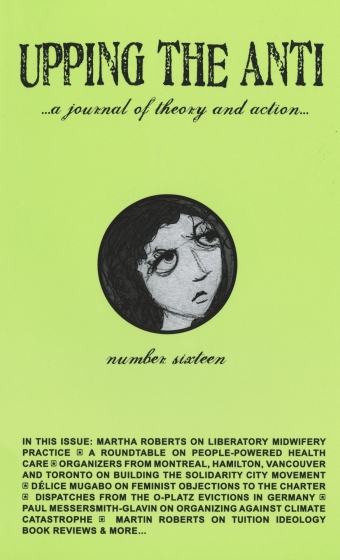Revolutionizing the Commons
Dear UTA,
As a 2013 bumper crop of grain threatens to rot in Prairie elevators without any interference by the recently defunct, farmer-run Canadian Wheat Board, and as lobster prices drop to as low as $2.20 a pound at communal wharfs while still fetching luxury prices in upscale restaurants, the limitations and minimal successes of commodity-producing commons become painfully clear. Wheat farmers and lobster fishers are vulnerable to forced disbandment by neoliberal governments and remain far too weak to insulate communities and workers from the vagaries of capitalist exploitation. Similarly, while many on the left engage in campaigns to save our farms, public schools, libraries, and transportation, our unpaid energy and labour is often harnessed to cheapen the costs of public/state forms of social reproduction. Finally, the rhetoric of the “commons” – employing words like “freedom” and “diversity” and countless other left initiatives and challenges – risks being emptied of all meaning by a rapacious social order intent on wielding the popularity of the notion for its own purposes.
George Caffentzis and Silvia Federici’s article in Issue 15 of Upping the Anti addresses a matter of urgency, and is indispensable in the fight to end capitalism and usher in a non-hierarchical egalitarian society. The authors challenge us to envision an anti-capitalist commons that emphasizes building capacity for communal reproduction, as well as an engagement with a prefigurative politics that can remove our skills, labour, resources, and communities from the machinations of capital and the state. Yet we should not underestimate how such a goal requires fundamental reformulations of the forms of activity, tactics, and leadership we value most in social movements.
While we are all familiar with the value of crisis to capital, our movements also judge themselves on their ability to mobilize against crises and the fear of ever greater social dislocation. On the other hand, attempts by radicals to create non-capitalist commons have frequently devolved into temporary autonomous zones that, by insulating themselves from crisis, rarely, if ever, engage anyone beyond a limited and homogenous membership. Such removal only alienates activists from the real, non-revolutionary needs of marginalized peoples. Caffentzis and Federici’s clarion call to emphasize social reproduction in our activism should make us pause and reassess the problems of such insular approaches. We are reminded of the power of preventative grassroots movements to divest society’s most vulnerable from the need to make demands upon the state and capital. Far more encouraging are efforts like the Drug Users Resource Centre in Vancouver’s Downtown Eastside, which has recently embarked on a cooperative skill-share program to teach active alcoholics to brew their own beer and wine. This is done to lessen their dependency on dangerous, cheaper forms of alcohol and share safer alternatives with other struggling alcoholics in Canada’s poorest postal code. Such communal reproduction does little to address systemic causes of alcoholism, but it is a powerful form of prefigurative politics that combines self-empowerment, community building, and a (partial) withdrawal from capital markets and reliance on demeaning, unrealistic, and punitive social services.
Finally, it should be said that starting with the anti-globalization protests of the 1990s all the way up to the recent Occupy movement, there has been a persistent patriarchal, racialized, privileged, ageist, and ablest insistence that we should value most those who monopolize the microphone, relish police confrontation and media melees, philosophize the moment, and command our attention. Despite Caffentzis’ important acknowledgement that the primary tasks of the early Occupy movement involved “housework,” such labour was also the site of some of the most intractable disagreements. At numerous Occupy encampments, stories arose of largely white, cis-male, privileged participants who saw their role as, at most, allocators of such work, leaving women, poor people and racialized occupiers to take the leading and essential roles of social reproduction. It is time that the so-called shit work, the day-to-day “drudgery” involved in keeping our movement alive, does not replicate the hierarchy of tasks inherent to capitalism. Not only does this work require our equal attention and effort, it needs to be elevated to revolutionary importance – without it, as Caffentzis and Federici powerfully remind us, there can be no commons against and beyond capitalism.
For a revolutionary commons,
David Thompson
Kingston, ON

